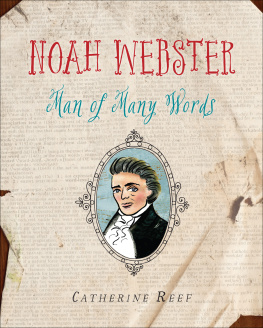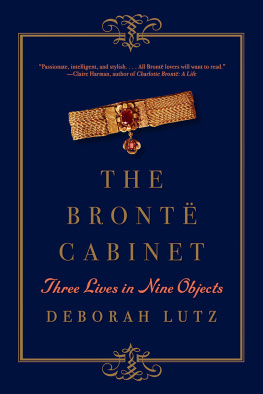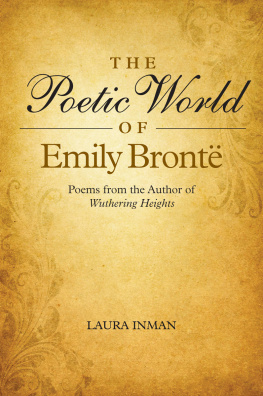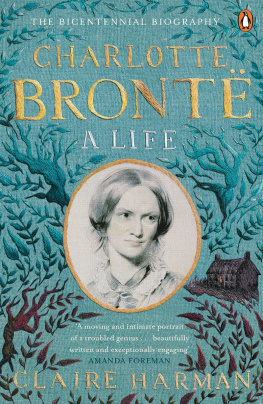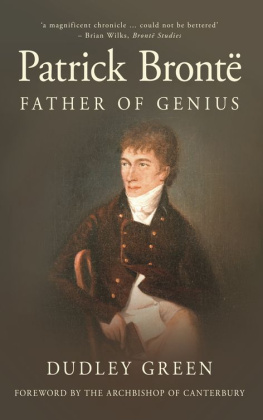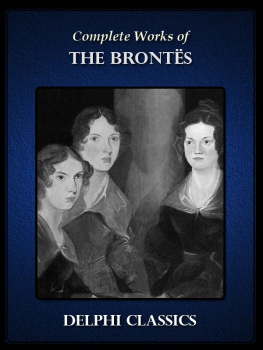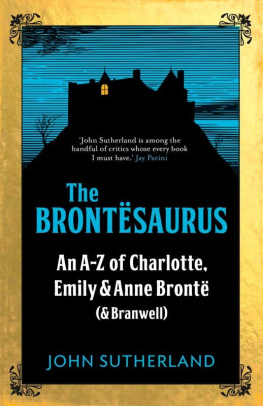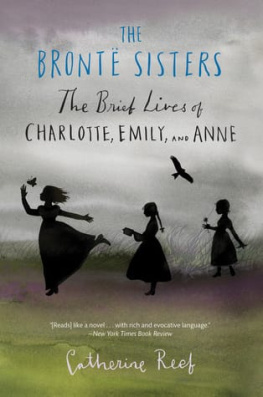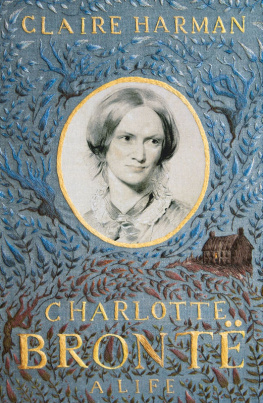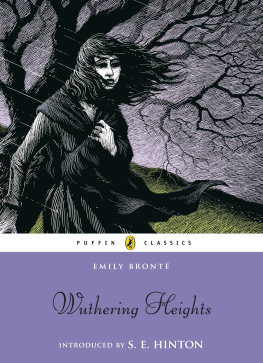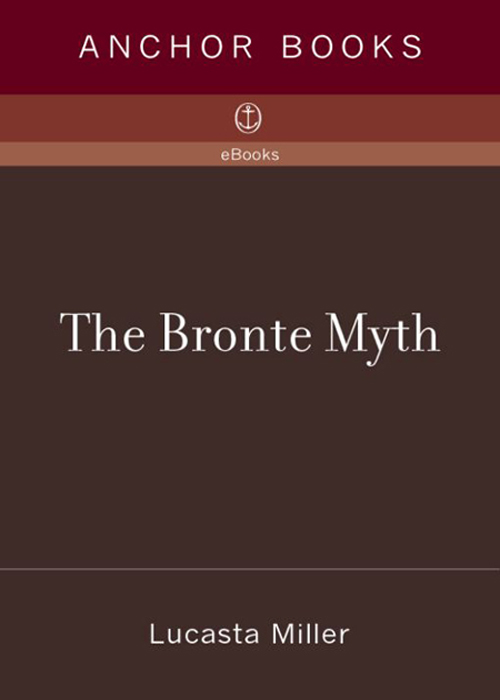

Table of Contents
In memory of my father
Acclaim for Lucasta Millers
THE BRONT MYTH
Miller unravels the Bront myth with tenacity, detail, and gracefrom souvenir tea towels and Haworth Parsonage mugs to Hollywood visions of wind-swept moors. In the process, she restores life to Emily and Anne, and especially to Charlotte. The Christian Science Monitor
Provocative.... The Bront Myth is a first-rate work of scholarship and criticism, and a surprisingly entertaining read. Thanks to Millers clearheadedness, it seems unlikely that the Bronts will ever again be marginalized into the spooky spinsters of the myth. San Jose Mercury News
[An] ingenious book. The New Yorker
Brilliant and riveting.... Millers unputdownable and erudite book has not only left us with a clearer picture and greater understanding of the Bronts and the nature of biography, but tells us a lot about ourselves. Daily Mail (London)
Sharply intelligent, original and witty.... Literary history is seldom related with such a pleasant combination of brio and erudition. The Sunday Times (London)
Excellent.... Lucasta Miller strips away all those inaccurate accretions which have turned Charlotte, Emily and Anne into uncanny, coughing geniuses.... Millers book is so good, clever and necessary that, far from making biographical writing redundant, it shows us just how wonderful it can occasionally be. The Bront Myth is essential reading. The Sunday Telegraph (London)
A witty deconstruction of Brontmania... done with a deft, light touch. The Guardian (UK)
Illustrations
7 Part of the manuscript of Charlottes 1830 satire, The Poetaster (The Pierpont Morgan Library, New York, MA2696)
11 The Bront sisters, painted in 1834 by their brother, Branwell (National Portrait Gallery, London)
43 The author of Jane Eyre, drawn by George Richmond in 1850 (National Portrait Gallery, London)
56 Elizabeth Gaskell, drawn by Samuel Lawrence in 1854 (Mrs. Trevor Dabbs)
71 Patrick Bront in old age (Bront Society)
77 Haworth Parsonage and church photographed c. 1860 (Bront Society)
77 Haworth Parsonage and church romanticized in a drawing by Mrs. Gaskell to illustrate her Life of Charlotte Bront (Bront Society)
81 Arthur Bell Nicholls (Bront Society)
94 The dutiful daughter: Charlotte serves a cup of tea to her blind old father. (From Women of Worth: A Book for Girls, 1859)
98 Charlottes ghost, from Thomas Stanley Wilmot, Twenty Photographs ofthe Risen Dead, 1894
105 Charlotte, from Fifty Famous Women: Their Virtues and Failings and theLessons of Their Lives, Anon., 1864
105 Charlotte, from Henry William Dulcken, Worthies of the World, 1881
105 Victorian image of Charlotte, source unverified (Mary Evans Picture Library)
105 Illustration by Charles Mozley from Girl with a Pen, Elisabeth Kyle, 1963
115 Crowds gather at Haworth Parsonage (Bront Society)
126 Charlotte Bront to Constantin Heger, January 8, 1845 (The British Library)
159 Twentieth CenturyFoxs Three Sisters of the Moors (British Film Institute)
159 Branwell paints his sisters in Warner Bros. 1943 biopic Devotion (Kobal Collection)
165 Isabelle Adjani as Emily, Isabelle Huppert as Anne, and Marie-France Pisier as Charlotte in Andr Techins Les Soeurs Bronts, 1979 (British Film Institute)
188 Emilys diary paper of June 26, 1837 (Bront Society)
260 Emily Bront by Branwell (National Portrait Gallery, London)
286 Emilys translation of Horace reveals the extent of her classical education (The Kings School, Canterbury)
Preface and Acknowledgments
Some years ago, when I was supposed to be working on a thesis about Milton, I used to find myself going home from the library and compulsively reading books to do with the Bronts. Their novelswhich I had first read in my early teensprovided emotional nourishment, but the legendary tale of their lonely moorland lives, which had gripped my imagination even before I was old enough to read Jane Eyre or Wuthering Heights, seemed to offer the allure of a more escapist fantasy.
Around the same time, I read Terry Eagletons Myths of Power: AMarxist Study of the Bronts (Basingstoke and London, 1975; 1988), and began to think more questioningly about the role the Bronts played not only in my own imagination but in culture at large. In his introduction, Eagleton remarked that the Bronts, like Shakespeare, are a literary industry as well as a collection of literary texts, and it would have been worth asking why this should be so and how it came about (p. xix). A decade on, this book is my personal attempt to answer that question.
As critics have often recognized, the two most famous Bront novels have become established not just as literary classics but as what might be called modern myths. Both Jane Eyre and Wuthering Heights have burst their generic boundaries and found their way into mass culture through Hollywood, stage versions, television, and even pop music. Yet what, for me, makes the Bronts so extraordinary is that unlike the authors of comparable modern mythsBram Stoker, say, who wrote Dracula the sisters themselves, plus their entire family, have become mythic figures in their own right. Since 1857, when Elizabeth Gaskell published her famous Life ofCharlotte Bront, hardly a year has gone by without some form of biographical material on the Bronts appearing from articles in newspapers to full-length lives, from images on tea towels to plays, films, and novelizations.
Like Jane Eyre, like Wuthering Heights, the tragic story of the Bront family has been told and retold time and again in endless new configurations. Cliff Richard may have starred as Heathcliff, but Sinead OConnor has played Emily Bront; Wuthering Heights, and more recently Jane Eyre, may have been adapted as operas, but the lives of their original creators have inspired ballets and a musical. George Eliot has never rivaled Maggie Tulliver in the imagination of readers. Thomas Hardy does not compete with Tess. Yet the Bronts of Haworth have become popular characters on a level with Jane Eyre and Rochester, Cathy and Heathcliff.
Henry James had a particularly suspicious attitude toward this romantic tradition of the Bront story, which he thought got in the way of serious critical appreciation of the sisters works. He felt that their life history had been made to hang before us as insistently as the vividest page of Jane Eyre or Wuthering Heights, resulting in an unprecedented muddle in the public mind. My purpose is to trace the historical route by which the Bronts lives came to take on this unusual prominence and to show how years of cultural accretion have shifted the sisters position in the collective consciousness from the level of history onto that of myth.
This book, therefore, is not so much a biography of the Bronts as a book about biography, a metabiography. Occasionally, when focusing on the sentimental excesses of the Bront cult, it may even read more like an antibiography. But while I share Henry Jamess anxiety about overemphasis on the Bront story, that is not to say that I reject the biographical approach per se. The Bronts lives
Next page

